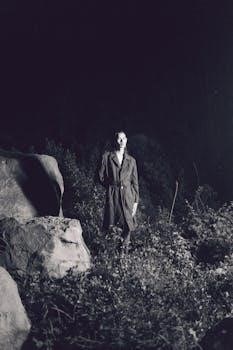Night by Elie Wiesel⁚ Questions and Answers
Exploring the depths of Elie Wiesel’s “Night” often brings forth numerous questions. A study guide can assist readers in understanding characters, themes, and symbols. Quizzes, essays and documents are a great way to review Night.
Character Analysis⁚ Eliezer (Elie) Wiesel
Eliezer, often called Elie, is the protagonist and narrator of “Night“. Initially, Elie is deeply religious, dedicating himself to studying the Talmud and Kabbalah. His faith is central to his identity. The Holocaust profoundly impacts Elie, leading to a significant transformation. Witnessing extreme cruelty and suffering causes him to question and ultimately lose his faith in God. His experiences in Auschwitz and Buchenwald strip him of his innocence. He is forced to confront the horrors of the Holocaust, leading to a loss of his childhood naivety. Elie’s relationship with his father, Shlomo, is a central element. As they endure the concentration camps, Elie becomes his father’s protector. The struggle for survival tests their bond, and Elie grapples with guilt as he prioritizes his own survival. The Holocaust profoundly affects Elie’s sense of self. He struggles with his identity as a Jew and a human being. He battles feelings of guilt, anger, and despair. Elie’s transformation is a key theme. His journey from a devout young boy to a disillusioned survivor highlights the devastating impact of the Holocaust on the individual. Ultimately, Elie survives the Holocaust. He bears witness to the horrors he experienced and dedicates himself to ensuring that such atrocities never happen again.
Moshe the Beadle⁚ Role and Significance
Moshe the Beadle is a significant character in Elie Wiesel’s “Night.” He serves as Elie’s Kabbalah teacher. Moshe is a poor and humble man who is deeply religious and teaches Elie about Jewish mysticism. He plays a vital role as a prophet. Before the mass deportations, Moshe is expelled from Sighet and witnesses the horrors of the Holocaust firsthand. He returns to warn the community. Moshe tries to warn the people of Sighet about the impending danger. He recounts the atrocities he witnessed, but the community dismisses his warnings, refusing to believe the extent of the cruelty. Moshe’s rejection highlights the community’s denial and disbelief. Their inability to comprehend the scale of the impending tragedy contributes to their vulnerability. Moshe’s character embodies the theme of ignored warnings. His experience foreshadows the horrors that await Elie and the other Jews of Sighet. His failed attempt to alert the community underscores the tragic consequences of indifference and denial. Despite being initially dismissed, Moshe’s warnings become tragically relevant. His character serves as a reminder of the importance of heeding warnings and confronting uncomfortable truths, even when they are difficult to accept.
Key Themes⁚ Faith, Silence, and Inhumanity

“Night” explores profound themes of faith, silence, and inhumanity. Faith is a central theme, as Elie’s religious beliefs are tested by the atrocities he witnesses. His initial devotion to Judaism gradually erodes as he struggles to reconcile the existence of a benevolent God with the horrors of the Holocaust. The loss of faith is a significant aspect of Elie’s journey. Silence is another pervasive theme. The silence of God, the international community, and the victims themselves underscores the abandonment and helplessness experienced during the Holocaust. This silence amplifies the sense of despair and moral decay. Inhumanity is starkly depicted through the brutal treatment of the prisoners in the concentration camps. The Nazis’ systematic dehumanization of the Jews is a central focus. The novel portrays the depths of human cruelty and the capacity for individuals to inflict unimaginable suffering on others. These themes intertwine to create a powerful narrative about the Holocaust. The loss of faith, the deafening silence, and the pervasive inhumanity combine to illustrate the devastating impact of the Holocaust on individuals and communities. Wiesel’s exploration of these themes prompts readers to confront the darkest aspects of human history and to consider the importance of memory, justice, and compassion.
Important Symbols in Night

“Night” employs powerful symbols that deepen its exploration of suffering and loss. Fire is a recurring symbol, representing both the destructive force of the Nazis and the spiritual destruction of the victims. The flames of the crematoria and the fires used to burn bodies symbolize the annihilation of faith and humanity. Night itself serves as a symbol of the darkness that descends upon the world during the Holocaust. It represents the absence of God, the loss of hope, and the moral darkness that engulfs humanity. The constant presence of night underscores the bleakness and despair experienced by the prisoners. Eyes are symbolic of witnessing and bearing witness. Elie’s eyes are a recurring motif, reflecting his transformation from an innocent boy to a traumatized survivor. The act of seeing and remembering becomes a crucial aspect of his identity and his responsibility to share his story. Corpses symbolize the dehumanization and loss of dignity suffered by the victims. The piles of bodies represent the sheer scale of the genocide and the reduction of human beings to mere objects. The sight of corpses haunts Elie and serves as a constant reminder of the horrors he endured. These symbols collectively amplify the themes of faith, silence, and inhumanity, creating a deeply affecting portrayal of the Holocaust.
Discussion Questions on Loss of Innocence

How does Elie Wiesel portray the gradual loss of innocence throughout “Night“? Trace the specific events and experiences that contribute to Elie’s transformation from a devout young boy to a disillusioned survivor. What role does witnessing extreme violence and cruelty play in shaping his understanding of the world? In what ways does Elie’s relationship with his faith change as he confronts the horrors of the Holocaust? How does the loss of faith contribute to his overall loss of innocence? Explore the significance of the “night” as a symbol of the encroaching darkness that consumes Elie’s innocence. How does the constant presence of night affect his perception of hope and humanity? Discuss the impact of separation from family and community on Elie’s sense of identity and innocence. How does the disintegration of his family unit contribute to his overall sense of loss? Analyze the moments when Elie is forced to make morally compromising decisions in order to survive. How do these choices challenge his sense of right and wrong, and how do they impact his innocence? Consider the ways in which the dehumanization of the prisoners contributes to their loss of innocence. How does the reduction of human beings to mere numbers affect their sense of self-worth and moral compass?
Analysis of Specific Passages
In “Night,” certain passages stand out for their profound impact and symbolic weight. Let’s delve into a detailed analysis of a few key excerpts. Consider the passage where Elie describes his first night in Auschwitz. What emotions does he convey, and how does the imagery contribute to the reader’s understanding of the horrors he is experiencing? Analyze the significance of his statement, “Never shall I forget that night, the first night in camp, that turned my life into one long night.” Explore the passage where Elie witnesses the burning of babies. How does this scene affect his faith and his view of humanity? What literary devices does Wiesel employ to convey the magnitude of this atrocity? Examine the passage where Elie struggles with his conscience after his father is beaten. What internal conflict does he face, and what does this reveal about the breakdown of familial bonds in the face of extreme adversity? Analyze the passage where Elie describes the death of his father. How does Wiesel portray the complex emotions of grief, guilt, and relief? What does this passage suggest about the ultimate impact of the Holocaust on the human spirit? Consider the final passage of the book, where Elie looks in the mirror and sees a corpse staring back at him. What is the significance of this image, and what does it convey about the lasting psychological damage inflicted by the Holocaust? How does Wiesel’s use of vivid and evocative language enhance the emotional impact of these passages?
Impact of the Holocaust on Elie’s Identity

The Holocaust profoundly reshaped Elie’s identity, stripping away his innocence and transforming his understanding of faith, humanity, and himself. Before the war, Elie was deeply religious, spending his days studying the Talmud and his nights in prayer. However, the horrors he witnessed in Auschwitz and Buchenwald shattered his faith, leading him to question God’s existence and justice. The systematic dehumanization of the Jewish people, the senseless violence, and the constant struggle for survival eroded Elie’s belief in the inherent goodness of humanity. The camps transformed Elie from a devout young boy into a hardened and cynical survivor. He witnessed acts of cruelty and selfishness that challenged his moral compass and forced him to confront the darkest aspects of human nature. The experience of starvation, disease, and constant fear left Elie physically and emotionally scarred. The loss of his family, his community, and his faith left a void in his soul that he struggled to fill. In the final pages of “Night,” Elie describes looking in the mirror and seeing a corpse staring back at him. This image symbolizes the death of his former self and the indelible mark that the Holocaust left on his identity;
Night as a Literary and Historical Document
“Night” stands as a powerful dual testament, functioning both as a significant literary work and a crucial historical document. As literature, it employs vivid imagery, stark prose, and profound symbolism to convey the emotional and psychological impact of the Holocaust on an individual. Wiesel’s personal narrative transforms the abstract horrors of the Holocaust into a tangible and deeply affecting experience for the reader. The book explores universal themes such as faith, loss, silence, and the struggle for survival, resonating with readers across cultures and generations.
However, “Night” is equally important as a historical document. It provides a firsthand account of the systematic dehumanization and extermination of Jews during World War II. Wiesel’s detailed descriptions of life in the concentration camps, the brutality of the Nazi regime, and the indifference of the world offer invaluable insights into this dark chapter of human history. The book serves as a vital reminder of the dangers of hatred, prejudice, and intolerance, urging readers to learn from the past and prevent such atrocities from happening again. “Night” has become a standard text in many educational settings, helping students understand the historical context of the Holocaust and its lasting impact on individuals and societies.






